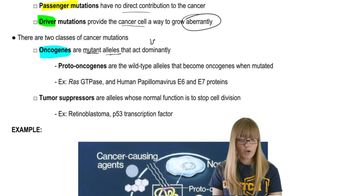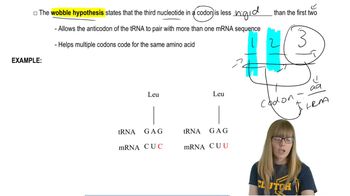Based on what you read in this chapter, Can a tumor arise from a single mutated cell? Are all the cells in a tumor identical?
Table of contents
- 1. Introduction to Genetics51m
- 2. Mendel's Laws of Inheritance3h 37m
- 3. Extensions to Mendelian Inheritance2h 41m
- 4. Genetic Mapping and Linkage2h 28m
- 5. Genetics of Bacteria and Viruses1h 21m
- 6. Chromosomal Variation1h 48m
- 7. DNA and Chromosome Structure56m
- 8. DNA Replication1h 10m
- 9. Mitosis and Meiosis1h 34m
- 10. Transcription1h 0m
- 11. Translation58m
- 12. Gene Regulation in Prokaryotes1h 19m
- 13. Gene Regulation in Eukaryotes44m
- 14. Genetic Control of Development44m
- 15. Genomes and Genomics1h 50m
- 16. Transposable Elements47m
- 17. Mutation, Repair, and Recombination1h 6m
- 18. Molecular Genetic Tools19m
- 19. Cancer Genetics29m
- 20. Quantitative Genetics1h 26m
- 21. Population Genetics50m
- 22. Evolutionary Genetics29m
19. Cancer Genetics
Cancer Mutations
Problem 9
Textbook Question
Define tumor-suppressor genes. Why is a mutated single copy of a tumor-suppressor gene expected to behave as a recessive gene?
 Verified step by step guidance
Verified step by step guidance1
Step 1: Define tumor-suppressor genes as genes that encode proteins responsible for regulating cell growth, repairing DNA damage, and ensuring cells do not divide uncontrollably, thereby preventing tumor formation.
Step 2: Explain that tumor-suppressor genes typically require both copies (alleles) to be inactivated or mutated to lose their function, which is why they are often considered recessive at the cellular level.
Step 3: Describe that when only one copy of a tumor-suppressor gene is mutated, the other normal copy can usually produce enough functional protein to maintain normal cell regulation.
Step 4: Clarify that this functional redundancy means a single mutated copy does not lead to loss of tumor-suppressor activity, so the mutated allele behaves recessively because the phenotype (loss of tumor suppression) only appears when both alleles are mutated.
Step 5: Summarize that the recessive behavior of tumor-suppressor gene mutations contrasts with dominant oncogenes, where a single mutated copy can promote cancer development.
 Verified video answer for a similar problem:
Verified video answer for a similar problem:This video solution was recommended by our tutors as helpful for the problem above
Video duration:
1mPlay a video:
Was this helpful?
Key Concepts
Here are the essential concepts you must grasp in order to answer the question correctly.
Tumor-Suppressor Genes
Tumor-suppressor genes are genes that regulate cell growth and division, preventing uncontrolled proliferation. They act as cellular brakes by repairing DNA damage or initiating apoptosis, thereby protecting against cancer development.
Recommended video:
Guided course

Mapping Genes
Recessive Nature of Tumor-Suppressor Gene Mutations
A mutation in a single copy of a tumor-suppressor gene usually does not cause loss of function because the other normal allele can compensate. Therefore, the mutated allele behaves recessively, requiring both copies to be inactivated for tumorigenesis.
Recommended video:
Guided course

Cancer Mutations
Two-Hit Hypothesis
The two-hit hypothesis explains that both alleles of a tumor-suppressor gene must be mutated or inactivated to lose function. The first 'hit' is often inherited or acquired, and the second 'hit' occurs somatically, leading to cancer progression.
Recommended video:
Guided course

Translation:Wobble Hypothesis
Related Videos
Related Practice
Textbook Question
473
views


